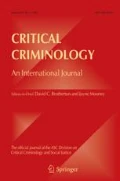Abstract
As a contribution to literature drawing together green criminology and studies of organised and corporate crime, this paper provides a case study of crimes and public health harms linked to the Naples garbage disposal crisis. The context is the inability of modern consumer society to cope with the problem of mass production of waste. In turn this leads to opportunities for both legal and criminal entrepreneurs to offer services that promise but fail to ‘dispose’ of the problem. The analysis draws upon environmental law and classic studies of organised crime.
Similar content being viewed by others
References
Ajello, R., & Ranawana, A., (1996). The West’s toxic trade with Asia, World Press Review, 43.
Astone, F. (2009). Gli affari di famiglia. Milan: Longanesi.
Beirne, P., & South, N. (Eds.). (2007). Issues in green criminology: Confronting harms against environments, humanity and other animals. Cullompton: Willan.
Block, A. (1991). Perspectives on organizing crime: Essays in opposition. Dordrecht: Kluwer.
Block, A., & Scarpitti, F. R. (1985). Poisoning for profit: The mafia and toxic waste in America. New York: William Morrow.
Brants, C. (1994). ‘The system’s rigged—Or is it?’. Crime, Law and Social Change, 21, 103–125.
Brusasco, T. (2009). Il caso Napoli e la stampa tedesca. Narcomafie, 4, 23.
Bullard, R. (1994). Unequal protection: Environmental justice and communities of colour. San Francisco: Sierra Club Books.
Cass, V. (1996). ‘Toxic tragedy: Illegal hazardous waste dumping in Mexico. In S. Edwards, T. Edwards, & C. Fields (Eds.), Environmental crime and criminality: Theoretical and practical issues. New York: Garland.
Chambliss, W. (1978). On the take: From petty crooks to presidents. Bloomington: Indiana University Press.
Croall, H. (2009). Community safety and economic crime. Criminology and Criminal Justice, 9(2), 165–185.
De Crescenzo, D. (2008). Sporco, troppo sporco. Narcomafie, 7–8, 15–16.
de Prez, P. (2000). Excuses, excuses: The ritual trivialisation of environmental prosecutions. Journal of Environmental Law, 12, 65–77.
De Stefano, B., & Iurrillo, V. (2009). La casta della monnezza. Rome: Newton Compton.
Du Rees, H. (2001). Can criminal law protect the environment? Journal of Scandinavian Studies, 2, 109–126.
Girling, R. (2005). Rubbish: Dirt on our hands and crisis ahead. London: Transworld.
Gobert, J., & Punch, M. (2003). Rethinking corporate crime. London: Butterworths.
Herbig, F. J. W., & Joubert, S. J. (2006). Criminological semantics: conservation criminology–vision or vagary? Acta Criminologica, 19(3), 88–103.
Huisman, W., & Niemeijer, E. (1998). Zicht op organisatiecriminaliteit: Een literatuuronderzoek. The Hague: SDU uitgevers.
Hutter, B. (1986). An inspector calls: The importance of proactive enforcement in the regulatory context. British Journal of Criminology, 26(2), 114–128.
Kofele-Kale, N. (2006). The international law of responsibility for economic crimes. Aldershot: Ashgate.
Landesco, J., (1973 [1929]), Organized crime in Chicago: Part III of the Illinois Crime Survey, Chicago: University of Chicago Press.
Lynch, M. (1990). The greening of criminology: A perspective on the 1990s. Critical Criminologist, 2, 3–4. 11–12.
Lynch, M., & Stretesky, P. (2001). Toxic crimes: Examining corporate victimization of the general public employing medical and epidemiological evidence. Critical Criminology, 10, 153–172.
Mandel, R. (1999). Deadly transfers and the global playground: Transnational security threats in a disorderly world. Praeger: Westport, Conn.
Moore, R. H. (1994). The activities and personnel of twenty-first century organised crime. Criminal Organizations, 9, 3–11.
Natale, S. (2009). Germania, modello Napoli. Narcomafie, 4, 20–24.
O’Brien, M. (2007). A crisis of waste? Understanding the rubbish society. London: Routledge.
Pareto, V. (1966). Sociological writings. London: Pall Mall Press.
Petrillo, A. (2009). Biopolitica di un rifiuto. Le rivolte anti-discarica a Napoli e in campania. Verona: Ombre Corte.
Piccoli, G. (2008). Rifiuti, camorra e mala amministrazione. Narcomafie, 7–8, 12–21.
Punch, M. (2009). ‘Why corporations kill and get away with it. In A. Nollkaemper & H. van der Wilt (Eds.), System criminality in international law (pp. 42–68). Cambridge: Cambridge University Press.
Rosenthal, E. (2008). A whiff of naples arrives in hamburg. New York Times, June 9th.
Ruggiero, V. (1996). Organised and corporate crime in europe: offers that can’t be refused. Aldershot: Dartmouth.
Ruggiero, V. (2000). Crime and markets. Oxford: Oxford University Press.
Ruggiero, V. (2007). It’s the Economy, Stupid! Classifying Power Crime. International Journal of the Sociology of Law, 35, 163–177.
Salzano, J. (1994). It’s dirty business: Organized crime in deep sludge. Criminal Organizations, 8, 17–20.
Simon, D. R. (2000). Corporate environmental crimes and social inequality. American Behavioural Scientist, 43, 633–645.
Sollund, R. (Ed.). (2008). Global harms: Ecological crime and speciesism. New York: Nova Publishers.
South, N. (1998). ‘Corporate and state crimes against the environment: Foundations for a green perspective in European criminology. In V. Ruggiero, N. South, & I. Taylor (Eds.), The New European Criminology (pp. 443–461). Routledge: London.
South, N., & Beirne, P. (Eds). (1998), For a green criminology. Special issue of theoretical criminology, 2, 2.
Stallworthy, M. (2008). Understanding Environmental Law. London: Sweet & Maxwell.
Sutherland, E. (1949). White-Collar crime: The uncut version. New York: Dryden Press.
Sykes, G., & Matza, D. (1957). Techniques of neutralization: A theory of delinquency. American Sociological Review, 22, 664–670.
Szasz, A. (1986). Corporations, organized crime, and the disposal of hazardous waste: An examination of the making of a criminogenic regulatory structure. Criminology, 24, 1–27.
Szasz, A. (1994). EcoPopulism: Toxic waste and the movement for environmental justice. Minneapolis: University of Minnesota Press.
van Duyne, P. (1993). ‘Organised crime and business crime-enterprises in the netherlands’. Crime, Law and Social Change, 19, 103–142.
Walters, R. (2010). Eco crime. In J. Muncie, D. Talbot, & R. Walters (Eds.), Crime: Local and global. Devon: Cullompton.
White, R. (2008). Crimes against nature: Environmental criminology and ecological justice. Willan: Cullompton.
Wilkinson, D. (2002). Environment and law. London and New York: Routledge.
Williams, C. (Ed). (1996) Environmental victims, special issue of social justice, 23, 4.
Wolf, S., & Stanley, N. (2003). On environmental law. London: Cavendish.
Wood, M. C. (2009). Advancing the sovereign trust. Environmental Law, 39(1), 43–89.
Author information
Authors and Affiliations
Corresponding author
Rights and permissions
About this article
Cite this article
Ruggiero, V., South, N. Green Criminology and Dirty Collar Crime. Crit Crim 18, 251–262 (2010). https://doi.org/10.1007/s10612-010-9122-8
Published:
Issue Date:
DOI: https://doi.org/10.1007/s10612-010-9122-8




